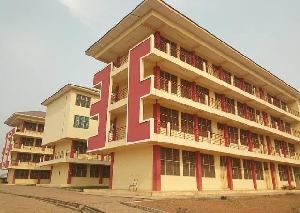In a carefully drafted memorandum to the Minister of Water Resources, Works & Housing, stakeholders of Ghana's built environment have raised serious questions about the proposed $10 billion joint venture agreement between STX Korea and the Government of Ghana for the construction of 200,000 housing units between 2010 and 2015.
In their memo dated June 9, 2010, the Joint Committee of the Ghana Institute of Architects, Ghana Institute of Planners, Ghana Institution of Engineers and Ghana Institution of Surveyors welcomed the bold project but added that Ghanaians don't need Koreans to come and build affordable homes for Ghana.
The memo seen exclusively by The Statesman, said, "In spite of the huge economic potential of this investment, there is strong possibility that the real economic benefits of this investment could elude Ghana and rather stimulate the South Korean economy."
Describing the project as potentially a "major catalyst or stimulus for a national economic turn-around," the memo stressed, "The project is so huge that if properly formulated, it could have the much desired impact on the local construction industry – by strengthening the indigenous capacity of the industry. The project has the potential of promoting local building materials production – it can become the pivot around which we promote viable small-scale brick and tile manufacturing nation-wide."
The stakeholders reminded Government that "As far back as the 1960’s, Ghanaians were in charge of large scale housing projects and even built the State House. Ghanaians fully managed and built Dansoman, Teshie-Nungua Estates etc. We may need technical assistance from South Korea when we need to build an Oil Refinery, Merchant or Navy Ships, Nuclear Plants etc but certainly NOT AFFORDABLE HOUSES!"
While giving their "full support for the proposal" or "objective of Government [towards] improving the housing stock by as wide a margin as 200,000 units," the joint committee made it clear that they "find the draft proposal as it stands now, unsatisfactory and certainly not in the interest of the Ghanaian economy."
They are, therefore, urging "Government to engage us, as leaders in the Construction Industry, to assist in reviewing the project proposal. The project must be demand-driven. In this way Government defines the project to suit a national development agenda with external assistance from South Korea or elsewhere in terms of concessionary funding."
The memo outlined a series of concerns with the STX deal. For instance, "It is not clear what construction technology and type of building materials will be deployed by STX Korea."
This, they say, is important because "the appropriateness or inappropriateness of choice of technology has a significant bearing on the final cost of houses, the employment generation quotient and the sustainability or how transferable the technology becomes."
The stakeholders of Ghana's Built Environment are also very sceptical about the promise from STX that their project, which requires Government to off-take 45% of the 200,000 housing units at a total cost of $4.5 billion to the state does not represent value for money and cannot be described as 'affordable' based on the scanty information made available by STX.
"If the houses to be built by the Koreans should be truly affordable, then we need to ensure that the cost is within the income profile of the target group. We should be guided by the fact that those in the lower-middle income group and lower income groups may fall within a bracket of GH¢150 to GH¢400 a month of net salary of which housing expenditure will most likely not exceed 40% of their disposable income. Within such estimates, an affordable house should not exceed US$15,000 – US$20,000," the memo suggested.
It also questions the basis of the promise from STX that the project guarantees at least 30% local content. "Experiences with similar large-scale foreign initiatives have all been negative – only a few local jobs are created; the technology becomes heavily dependent on foreign inputs and expertise; the production process becomes over-centralized and therefore heavily dependent on haulage over long distances; the technology never gets transferred to the local industry," the memo argued.
They have also expressed concern over the decision by STX to opt for the Kwame Nkrumah University as project consultants for the multi-billion dollar project. "The appointment of KNUST College of Architecture and Planning as Consultants to STX Korea is a matter of grave concern to us as professionals of the Built Environment."
Whiles not questioning the competence of their professional colleagues at the University, which they say "has never been in doubt," the memo stressed the importance of appreciating that KNUST's "core business is to teach and research."
The added, "The current circumstances of capacity constraints at the University will mean that this project will only further jeopardize their capacity limitations. Besides, the University is not noted for a rich experience in implementation of such projects in Ghana. On the contrary, there are several private firms with the request experience, expertise operating far below capacity, with a large pool of young professionals waiting to be engaged by such firms."
They are worried about the capacity of Government to supervise and ensure value for money for such a turn-key project. "A project designed as an EPC Agreement demands first and foremost the keenest supervision by Government. Otherwise, it becomes as good as giving the Koreans a blank cheque. The Ministry of Water Resources, Works and Housing does not as yet have adequate capacity to supervise such a complex project nation-wide. "
Business News of Thursday, 24 June 2010
Source: Gabby Asare Otchere-Darko












